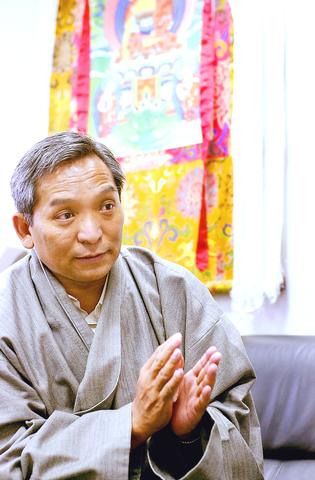Living in exile has many challenges, especially in a place like Taiwan, which only recently began to hush its past claims -- not unlike China -- that Tibet is a part of China.
But gradually, through increased interaction, a second visit by the Dalai Lama and hard work, culture can be preserved rather than lost, Tenzin Phuntsok Atisha, the managing director of the Tibet Religious Foundation of His Holiness the Dalai Lama (
"It's very important to preserve our identity and culture. I notice that some young Tibetans who came here or were born here don't speak the language, not to mention read or write it. We all have to put in a lot of effort in this respect," said Atisha sitting in his 10th floor downtown Taipei office.

PHOTO: CHEN CHENG-CHANG, TAIPEI TIMES
Aside from a colorful silk embroidered painting of the Buddha or Thangka and some pictures of the Dalai Lama, his office is decorated modestly, with only a few items that give any hint of his past and homeland.
Like many Tibetans in exile, Atisha and his family had to go through a significant ordeal in order to escape from Tibet.
Atisha says he still remembers vividly how brightly the snow shined in his eyes when he and his family members were crossing the Himalaya range when he was six years old.
"It was a sunny spring day. My father, brother and I were taking a path near our village to cross the Himalayas, while my mother was in another group. We saw so many dead people along the way.
"It was very, very scary. We eventually ran out of food, but luckily we made it to Nepal," he said.
The five-day journey led him to a new world that promised good food, a new life, education and a career.
Ironically for some of the 700 Tibetans who live in Taiwan, the government organization that helped them get to the country is the biggest obstacle in preserving their heritage and giving them a helping hand, he said.
The Cabinet's Mongolian and Tibetan Affairs Commission (
"That's why the Tibetans say that there are two Chinas: Red China and Black China. Fortunately, the situation changed dramatically in 1997 when the Dalai Lama first visited Taiwan. Now Tibetans no longer consider Taiwan as a `black China' but as our friends, our brothers and sisters," he said.
The commission is still there, however, only with its work minimized.
"We actually have great trust in and respect for the incumbent chairman, Mr Hsu [Hsu Cheng-kuang,
The commission has made life for some Tibetan immigrants in Taiwan miserable, Atisha added.
"Most of them came to Taiwan with the commission's assistance but they are at risk of becoming illegal residents.
"Their illegal status prevents them from finding a job or finding a job with a good salary," he said, adding that the foundation has been in touch with the Chen administration regarding the problem.
"[The administration is] very sympathetic and willing to solve the problem. I believe within months this problem will be solved," he said.
Atisha said that about 130 Tibetans are currently residing illegally in Taiwan, mostly in the Taipei area.

Conflict with Taiwan could leave China with “massive economic disruption, catastrophic military losses, significant social unrest, and devastating sanctions,” a US think tank said in a report released on Monday. The German Marshall Fund released a report titled If China Attacks Taiwan: The Consequences for China of “Minor Conflict” and “Major War” Scenarios. The report details the “massive” economic, military, social and international costs to China in the event of a minor conflict or major war with Taiwan, estimating that the Chinese People’s Liberation Army (PLA) could sustain losses of more than half of its active-duty ground forces, including 100,000 troops. Understanding Chinese

The Ministry of Foreign Affairs (MOFA) yesterday said it is closely monitoring developments in Venezuela, and would continue to cooperate with democratic allies and work together for regional and global security, stability, and prosperity. The remarks came after the US on Saturday launched a series of airstrikes in Venezuela and kidnapped Venezuelan President Nicolas Maduro, who was later flown to New York along with his wife. The pair face US charges related to drug trafficking and alleged cooperation with gangs designated as terrorist organizations. Maduro has denied the allegations. The ministry said that it is closely monitoring the political and economic situation

UNRELENTING: China attempted cyberattacks on Taiwan’s critical infrastructure 2.63 million times per day last year, up from 1.23 million in 2023, the NSB said China’s cyberarmy has long engaged in cyberattacks against Taiwan’s critical infrastructure, employing diverse and evolving tactics, the National Security Bureau (NSB) said yesterday, adding that cyberattacks on critical energy infrastructure last year increased 10-fold compared with the previous year. The NSB yesterday released a report titled Analysis on China’s Cyber Threats to Taiwan’s Critical Infrastructure in 2025, outlining the number of cyberattacks, major tactics and hacker groups. Taiwan’s national intelligence community identified a large number of cybersecurity incidents last year, the bureau said in a statement. China’s cyberarmy last year launched an average of 2.63 million intrusion attempts per day targeting Taiwan’s critical

AGING: As of last month, people aged 65 or older accounted for 20.06 percent of the total population and the number of couples who got married fell by 18,685 from 2024 Taiwan has surpassed South Korea as the country least willing to have children, with an annual crude birthrate of 4.62 per 1,000 people, Ministry of the Interior data showed yesterday. The nation was previously ranked the second-lowest country in terms of total fertility rate, or the average number of children a woman has in her lifetime. However, South Korea’s fertility rate began to recover from 2023, with total fertility rate rising from 0.72 and estimated to reach 0.82 to 0.85 by last year, and the crude birthrate projected at 6.7 per 1,000 people. Japan’s crude birthrate was projected to fall below six,